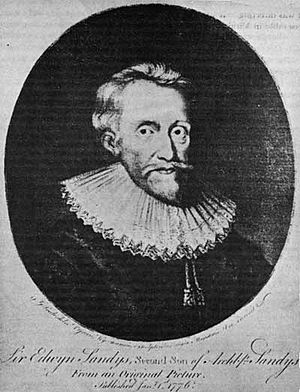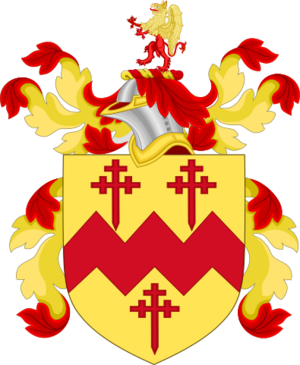Edwin Sandys (1561–1629) facts for kids
Sir Edwin Sandys (pronounced SANDZ; 9 December 1561 – October 1629) was an important English politician. He served in the English Parliament many times between 1589 and 1626. He was also one of the main people who started the Virginia Company of London. This company created the first lasting English settlement in what is now the United States. This settlement was the Virginia colony, based at Jamestown, founded in 1606. A place in Bermuda, called Sandys, is named after him. Bermuda was the Virginia Company's second colony.
Contents
Early Life and Education
Edwin Sandys was born in Worcestershire, England. He was the second son of Edwin Sandys, who was the Archbishop of York, a very important church leader.
He went to Merchant Taylors' School starting in 1571. Later, he studied at Corpus Christi College, Oxford, from 1577. He earned his first degree in 1579. At Oxford, his teacher was Richard Hooker, a famous writer. Sandys and Hooker became lifelong friends.
In 1589, Sandys was chosen to be a Member of Parliament for Plympton Erle. He also joined the Middle Temple, a place where lawyers trained. He was re-elected as an MP for Plympton Erle in 1593.
From 1593 to 1599, Sandys traveled in other countries. While in Venice, he met Fra Paolo Sarpi, who helped him write a book about religion in Europe. This book was called A Relation of the State of Religion in Europe.
When Queen Elizabeth I was close to death, Sandys became close to King James VI of Scotland. When James became King of England in 1603, Sandys was made a knight.
Career as a Member of Parliament
In 1604, Sir Edwin Sandys became an MP for Stockbridge in King James's first parliament. He became known for fighting against large companies that had special rights (called monopolies). He also tried to make sure that all prisoners could have a lawyer to help them.
In 1614, he was elected as an MP for Rochester. He was also appointed as the High Sheriff of Kent for 1615-1616.
Sandys continued to serve in Parliament for King James I. He was an MP for Sandwich in 1621 and for Kent in 1624.
He often disagreed with the King's court. Because of this, he was sometimes suspected of being against the King. However, he would promise to obey the King, which helped calm things down. He was an MP for Penryn in the first parliament of King Charles I in 1625 and again in 1626.
Helping the Virginia Company Grow
Sir Edwin Sandys was involved with the British East India Company before 1614. But his most important work was for the Virginia Company of London. He became the company's treasurer in 1619.
He started a plan to encourage people to move to the New World. His plan gave land in Virginia to those who chose to live there. Settlers who arrived before 1616 received 100 acres each. Those who came after 1616 received 50 acres. He also sent many farmers to work on land owned by the company. He encouraged them to grow more than just tobacco for trade.
To get more workers to Virginia, his plan also promoted indentured servitude. This meant poor people from England could agree to work for a set time in the colony to make a better life. These ideas helped Virginia grow quickly.
Sandys also strongly supported the headright system. His main goal was to create a lasting colony that would make England bigger. He also wanted to help with England's growing population and create new markets for English goods. Sandys also helped send more women to the colonies. This was to encourage men to marry and start families, hoping it would make them work harder.
Sir Edwin Sandys was also key in setting up the first group of elected representatives in the New World at Jamestown. He helped the Pilgrims start their colony at Plymouth, Massachusetts. He lent them 300 pounds without interest. Because of this, some people accused Sandys of wanting to create a republic (a country without a king) in Virginia.
Even though Sandys never went to Virginia, he worked very hard in England to support the colony. He helped create policies that allowed the colony to survive its difficult early years. He remained a main leader in the Virginia Company until it closed in 1624.
The Virginia Company eventually failed financially by 1624. However, the Virginia colony itself grew and became successful. It later gained independence in the late 1700s after the American Revolutionary War.
Later Life and Legacy
Sir Edwin Sandys passed away in October 1629. He left £1500 to the University of Oxford. This money was to pay for a special lecture series.
Sandys is buried in Northbourne Church in Kent with his last wife, Catherine.
Family
Sir Edwin Sandys was married four times. With his last wife, Catherine Bulkeley, he had seven sons and five daughters. Some of his notable children include:
- Henry (born around 1607), who became an MP.
- Edwin Sandys (Parliamentarian) (died 1642), who was a Colonel in the Parliamentary Army.
- Richard (1608–1665), who was also a Colonel in the Parliamentary Army.
Sandys Parish, in Bermuda, is named after him. This area includes Somerset Village and the Royal Naval Dockyard.
Images for kids
See also
 | Charles R. Drew |
 | Benjamin Banneker |
 | Jane C. Wright |
 | Roger Arliner Young |




